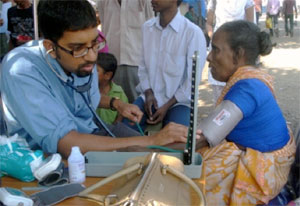Profile: Fogarty Fellow Dr Ramnath Subbaraman examines mental health in Indian slums
July / August 2013 | Volume 12, Issue 4

Fogarty Fellow Dr. Ramnath Subbaraman is working
to determine the mental health impacts of life in the
slums of Mumbai.
By Arthur Allen
On a daily basis, millions of its people face police extortion, unpleasantly close neighbors, hungry rats, long lines to buy expensive, sometimes contaminated water, and the threat the government will destroy their homes. Clearly, stress has a whole different meaning in the slums of Mumbai.
So what are the mental health consequences of such an existence? Dr. Ramnath Subbaraman hopes to find the answers during a Fogarty Global Health Program Fellowship, which has helped him penetrate deeply into the life of Kaula Bandar, an illegal slum of 12,000 people living in makeshift hovels on a Mumbai wharf.
The main focus of Subbaraman's project is to determine the mental health impacts of life in a "non-notified slum." About half of India's 93 million slumdwellers live in such communities, which lack official recognition and thus have no access to municipal water supplies or other services.
The research project, which Subbaraman began in 2010, has already shown that the lack of fundamental needs such as water, toilets and shelter in Kaula Bandar appear to lead to worse health outcomes than in comparable "notified" Mumbai slums that have more stable access to necessary services. The project is supported by the Rockfeller Foundation, with research collaborators from the Harvard School of Public Health, New York University and a local NGO, Partners for Urban Knowledge, Action and Research (PUKAR).
Subbaraman first became interested in global health on a year abroad in South Africa during the peak of the HIV epidemic. Then, as a medical student and Fogarty Scholar in 2005, he took care of sick AIDS patients and studied drug toxicities, anemia and other health issues in Chennai, India.
The research techniques he learned during that experience, Subbaraman says, were enormously helpful when he got to Mumbai and plunged into one of the densest slums on earth. He and his colleagues, including about a dozen young "barefoot researchers" he hired from the community and trained, first performed a comprehensive study of the area's drinking water, which is illegally tapped from fire department pipes and brought in through torn water hoses that traverse waterways contaminated with saline and feces.
While the WHO says every person should get 50 liters of water per day and Americans typically use 300, Kaula Bandar residents frequently have access to fewer than 20 liters per day. After conducting in-depth interviews in Tamil, a local language, Subbaraman and his teams entered homes, measured usage, tested samples and interviewed water sellers. They carried out a water study and also compiled a questionnaire on the chronic stressors of slum life. After being presented with the study data, city officials agreed to bring clean piped water to Kaula Bandar.
"We strongly felt the need to see local change and not rest on the notion that our research would have theoretical benefit years down the road," notes Subbaraman. In another example of research quickly making a difference, when a PUKAR survey showed an immunization rate of only 29 percent among the district's children under five years of age, the government provided assistance so PUKAR could train a community education team that increased coverage to more than 80 percent within three years.
"Fogarty contributed in a very significant way to the lives of the people in Kaula Bandar," says Dr. Anita Patil-Desmukh, executive director of PUKAR. "It supported Ramnath's outstanding scholarship, and this allowed him and the team to lobby the Mumbai government to start health camps and bring water into the community."
Some of the 18- to 25-year-old Kaula Bandar residents trained by Subbaraman and others through these programs are using their compensation from the research work for school bills, and may themselves pursue careers in public health.
More Information
Related Publications
- The psychological toll of slum living in Mumbai, India: A mixed methods study. Subbaramana R, Nolanc L, Shitolea T, Sawanta K, Shitolea S, Soodd K, Nanarkara M, Ghannamd J, Betancourtf TS, Bloomf DE, Patil-Deshmukha A. Social Science and Medicine. 2014 Oct; 119:155-169.
- The social ecology of water in a Mumbai slum: failures in water quality, quantity, and reliability. Subbaraman R, Shitole S, Shitole T, Sawant K, O'Brien J, Bloom DE, Patil-Deshmukh A. BMC Public Health. 2013 Feb 26;13:173.
- Off the map: the health and social implications of being a non-notified slum in India. Subbaraman R, O'Brien J, Shitole T, Shitole S, Sawant K, Bloom DE, Patil-Deshmukh A. Environ Urban. 2012 Oct;24(2):643-663.
- Factors associated with anaemia in HIV-infected individuals in southern India. Subbaraman R, Devaleenal B, Selvamuthu P, Yepthomi T, Solomon SS, Mayer KH, Kumarasamy N. Int J STD AIDS. 2009 Jul;20(7):489-92.
- Domestic violence and forced sex among the urban poor in South India: implications for HIV prevention. Solomon S, Subbaraman R, Solomon SS, Srikrishnan AK, Johnson SC, Vasudevan CK, Anand S, Ganesh AK, Celentano DD. Violence Against Women. 2009 Jul;15(7):753-73.
- Comorbidities among HIV-infected injection drug users in Chennai, India. Solomon SS, Hawcroft CS, Narasimhan P, Subbaraman R, Srikrishnan AK, Cecelia AJ, Suresh Kumar M, Solomon S, Gallant JE, Celentano DD. Indian J Med Res. 2008 May;127(5):447-52.
To view Adobe PDF files,
download current, free accessible plug-ins from Adobe's website.